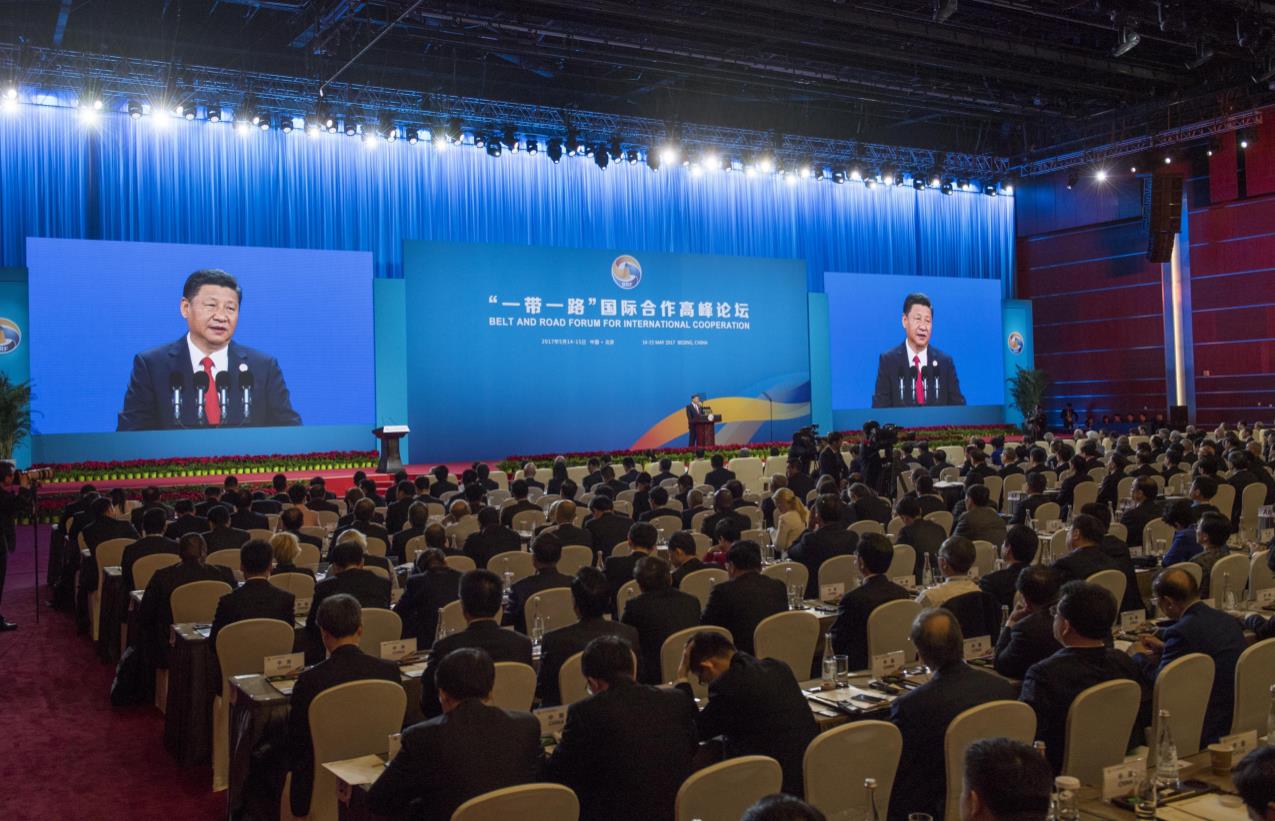
New York Times reports that President Xi Jinping of China delivered a sweeping vision of a new economic global order on Sunday, positioning his country as an alternative to an inward-looking United States under President Trump. Mr. Xi, surrounded by autocratic leaders from Russia and Central Asia at a forum in Beijing, pledged more than $100 billion for development banks in China that he said would spearhead vast spending on infrastructure across Asia, Europe and Africa. Noticeably absent from the gathering were leaders of major Western democracies. Sparing no modesty for the plan, Mr. Xi called the initiative, known as "One Belt, One Road," "this project of the century." The program, based on Chinese-led investment in bridges, rails, ports and energy in over 60 countries, form the backbone of China's economic and geopolitical agenda. In a new twist for China, which has generally been skeptical of social programs by the World Bank, Mr. Xi said the initiative would tackle poverty in recipient countries. He promised to deliver emergency food aid and said China would begin "100 poverty projects," though he stopped short of providing details. He portrayed the plan as "economic globalization that is open, inclusive, balanced and beneficial to all." China would invite the World Bank and other international institutions to join it in meeting the needs of developing — and developed — countries, he said, in a suggestion that he is seeking to forge new markets and export China's model of state-led expansion.
- Reuters reports that Chinese Premier Li Keqiang said on Sunday that China is capable of maintaining stability in its financial markets.China will also strike a balance between financial stability, gradual deleveraging and steady economic growth, Li said during a meeting with International Monetary Fund's Managing Director Christine Lagarde on the sidelines of the Belt and Road Forum in Beijing. Prudent monetary policy will be maintained and the yuan currency will be kept basically stable, Li said in a statement issued by the foreign ministry. China's top leadership has identified the containment of financial risks and asset bubbles as a top priority this year. At the same time, authorities have moved cautiously to avoid actions that would hurt economic growth, gingerly raising short-term interest rates.
- Reuters reports that the United States welcomed efforts by China to promote infrastructure connectivity as part of its Belt and Road initiative and U.S. companies can offer top value services, White House adviser Matt Pottinger said on Sunday. China launched its biggest diplomatic event of the year on Sunday, focused on President Xi Jinping's signature foreign and economic policy espousing billions of dollars of infrastructure investment linking Asia, Europe and Africa. "The United States recognizes the importance of improving economic connectivity through high-quality infrastructure development, and hence, welcomes efforts from all countries, including China, in achieving this," Pottinger said, according to a statement from the U.S. Embassy in Beijing. Representatives of numerous countries are attending the forum, including North Korea, which the United States has objected to. Two sources with knowledge of the situation said the United States sent a diplomatic note to China on Friday warning that North Korea's attendance sent the wrong message at a time when the world was trying to pressure it over its repeated missile and nuclear tests. North Korea tested another missile on Sunday.
- 2017-05-12 U.S. announces trade progress with China in 10 key areas
- 2017-05-11 South Korea’s New President Moves to Soothe Tensions With China
- 2017-05-10 S. Korea’s leader willing to visit North, talk to US, China
- 2017-05-09 Senate Panel Approves Trump's Pick for US Envoy to China
- 2017-05-08 Trump Looms as Kushner Companies Courts Investors in China
- 2017-05-07 Taiwan arms deal in limbo as Trump courts China
- 2017-05-05 With maiden jet flight, China enters dog-fight with Boeing, Airbus
- 2017-05-04 China encircles the world with One Belt, One Road strategy
- 2017-05-03 Trump’s Turn Toward China Curtails Navy Patrols in Disputed Zones
- 2017-05-02 China: US, N. Korea should establish contact, defuse crisis
- New York Times US Firms Want In on China's Global 'One Belt, One Road' Spending
- Financial Times Kenya president urges rebalance of China-Africa trade
- Bloomberg China Eyes U.S. Energy After Inking $20 Billion in Deals
- New York Times In Beijing, Vladimir Putin Plays Two Piano Tunes From His Childhood
- Bloomberg Beijing Suddenly Has Blue Skies, Clean Air as Xi Hosts Summit
- Reuters China's COSCO to invest in Kazakhstan border project as part of Silk Road drive
- Bloomberg China Watchers Caught Off Guard as End to Bond Rout Hard to Call
- CNN North Korea blights China's One Belt, One Road party with missile launch
- CNBC China's Sinopec expects to double foreign investment to more than $30 billion
- Financial Times China's Xi hails Belt and Road as 'project of the century'
- Reuters China-led AIIB expects to have 85 members by end-2017 - president
- Reuters India skips China's Silk Road summit, warns of 'unsustainable' debt
- Wall Street Journal China's President Xi Casts Country as Guardian of Globalization
- Reuters Britain says it's a natural partner for China's new Silk Road
- Reuters Nepal in talks with China to build $8 billion cross-border rail link: finance ministry official
- Bloomberg Cruises Boom as Millions of Chinese Take to the Seas
- Wall Street Journal Trump's Pretty Good China Deal
- Financial Times China's Xi hails Belt and Road as 'project of the century'
- Forbes Trump's New China Deal May Increase US Trade Deficit
